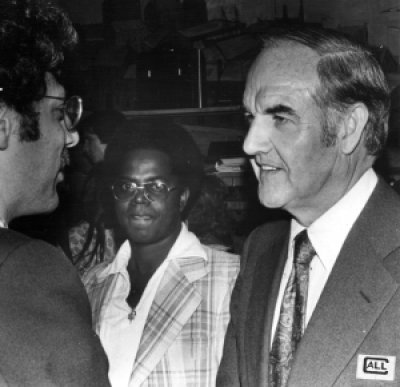 George McGovern was the only presidential candidate I ever worked for. In the fall of 1972 I was a 16-year-old junior at Middleborough (Mass.) High School and a McGovern volunteer. Mainly I made calls to supposedly undecided voters, and was informed by more than one that I was working for a “communist.”
George McGovern was the only presidential candidate I ever worked for. In the fall of 1972 I was a 16-year-old junior at Middleborough (Mass.) High School and a McGovern volunteer. Mainly I made calls to supposedly undecided voters, and was informed by more than one that I was working for a “communist.”
McGovern was one of the most decent people ever to seek the presidency, and I was sorry to learn of his passing this morning. I don’t know what kind of a president he would have been — I suspect he would have made Jimmy Carter look like a decisive executive by comparison. But he had a war hero’s aversion to war, and his generous spirit would have been welcome qualities in any of the presidents elected since his failed 1972 campaign. Needless to say, he would have been vastly superior to Richard Nixon, who defeated him in that historic landslide.
In April 1978, when I was a Northeastern co-op student working at the Woonsocket (R.I.) Call, I covered a speech McGovern gave in Boston, and took the photo you see here. It would probably take me half a day to find the clip, and it wouldn’t be of much account anyway. But I had just read Hunter S. Thompson’s “Fear and Loathing on the Campaign Trail ’72,” and I remember asking McGovern if Thompson’s description of McGovern’s reasoning for dropping Thomas Eagleton from the ticket was accurate.
McGovern paused a moment, and then confirmed Thompson’s account. I thought it was a remarkable admission. Thompson had written that McGovern believed Eagleton’s mental illness was so severe that he had concluded he couldn’t run the risk of his becoming vice president — or, possibly, president. In 2005, McGovern told the New York Times: “I didn’t know a damn thing about mental illness, and neither did anyone around me.”
The last time I saw McGovern was in 1984, four years after he had been defeated for re-election to the Senate. He was running for president again and was taking part in a debate among the Democratic candidates. It might have been at Harvard, but I’m not entirely sure. It seemed that time had passed him by, and indeed he wasn’t a factor in what turned out to be a two-man race between Walter Mondale and Gary Hart.
During the debate, McGovern sharply criticized the federal government’s decision to break up the AT&T monopoly two years earlier. Even then, it seemed like an old man’s lament. With the passage of time, it became clear that the break-up unleashed technological innovation that wouldn’t have otherwise been possible. McGovern’s era was over, as even liberal Democrats had moved on.
After that, McGovern faded from view. It is to Bill Clinton’s credit that he gave the former senator useful work, and awarded him the Presidential Medal of Freedom. Still, his declining years could not have been happy ones, as he lost two of his adult children following long struggles with alcohol abuse.
George McGovern was one of the great public figures of the second half of the 20th century. Simply put, he showed us all a better way. It was not his fault that we chose not to take it. And now his voice has been stilled.
Update: You’re going to see a lot of fine tributes to McGovern in the days ahead. This one, by Joe Kahn of the Boston Globe, is well worth your time.
Discover more from Media Nation
Subscribe to get the latest posts to your email.

Patricia Daukantas
Great tribute.
On the subject of press critiquing … it’s 11:30 a.m. and I am still waiting for the Washington Post’s website to publish an obituary for Sen. McGovern. One would think that, because the District was the only other place besides Massachusetts to give him electoral votes, there would be a local angle for the Post. But no mention yet.
Granted, the Post website had a couple of brief stories last week on the senator’s declining health, but those news briefs did not constitute an obituary.
Rick Peterson
And Sen. Kennedy’s legacy gets a bit more complicated. I wonder whether Kevin White might have made a difference in the election if Ted had thought of his country first when he was consulted.
http://www.wbur.org/2012/01/29/kevin-white-legacy
Patricia Daukantas
Finally the Post’s obituary has appeared. I don’t know whether the delay came from the Post or from some sort of internet glitch.
Steve Rhode
I don’t think that it mattered much what McGovern thought about Eagleton’s depression and treatments in those days. Eagleton’s days as running mate were done when the story broke. Like with George Romney’s brain washing comment 5 years earlier, there was no tolerance for any admission of weakness in political circles back then.
Dan Kennedy
@Steve: I’d have to look it up, but another thing I remember from Thompson’s book was that McGovern knew his decision to dump Eagleton from the ticket meant the end of any hope he had of winning. McGovern may have been misguided about mental illness, but he dropped Eagleton for patriotic rather than political reasons.
Al Quint
a great man. I’m glad I had the opportunity to vote for him in 1984, even though I knew he wouldn’t get the nomination. It was a symbolic gesture to honor him. Good piece, Dan.